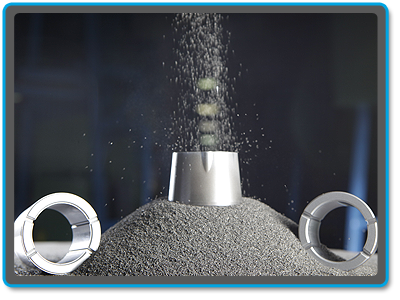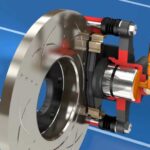
The basic Powder Metallurgy process for structural press and sintered components
Powder Metallurgy comprises a family of production technologies, which process a feedstock in powder form to manufacture components of various types. These production technologies generally involve all or most of the following process steps:
Powder production
Virtually all iron powders for PM structural part production are manufactured using either the sponge iron process or water atomisation. Non ferrous metal powders used for other PM applications can be produced via a number of methods.
Mixing of powders
This can often involve the introduction of alloying additions in elemental powder form or the incorporation of a pressing lubricant.
Forming of the mixed powder into a compact
The dominant consolidation process involves pressing in a rigid toolset, comprising a die, punches and, possibly, mandrels or core rods. However, there are several other consolidation processes that are used in niche applications.
Sintering of the compact to enhance integrity and strength
This process step involves heating of the material, usually in a protective atmosphere, to a temperature that is below the melting point of the major constituent. In some cases, a minor constituent can form a liquid phase at sintering temperature; such cases are described as liquid phase sintering. The mechanisms involved in solid phase and liquid phase sintering are discussed briefly in a later section.
Secondary operations
The application of finishing processes to the sintered part. In the Powder Metallurgy industry, such processes are often referred to as “secondary operations”.


